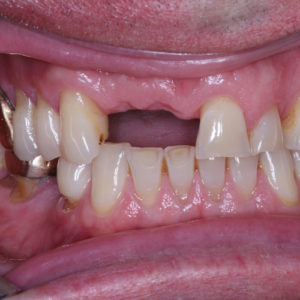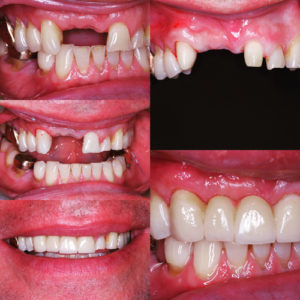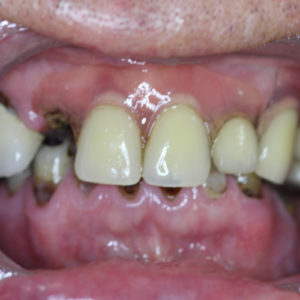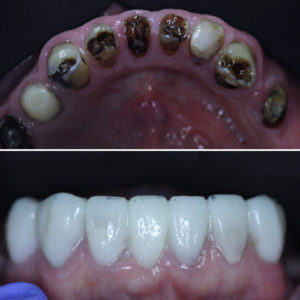FOCUSSING ON CARE AND PREVENTION
FOR EVERYONE IN THE FAMILY
THE ART & SCIENCE OF FAMILY DENTISTRY
- Family Dentist For Everyone
- Hygiene Treatments
- Airpolishing – Badly Stained Teeth
- Fillings – White
- Bridges
- Crowns
- Porcelain Inlays And Onlays
- Root Canal Infections
- Cracked Teeth
- Misshapen Teeth
General Dentistry
ANTERIOR MISSING TEETH REPLACED USING A PORCELAIN BRIDGE
I would like to help you transform your smile, just like Neil
“Very pleased with the overall experience and the end result. Pretam and his nurses are very professional and helpful. I will be bringing my family along.”
Complex dentistry
FULL MOUTH ORAL REHABILITATION DONE TO RESTORE FORM AND FUNCTION
I would like to help you transform your smile, just like Paul
“Extremely meticulous. Beautiful result. Never have I been so happy with my smile.”
Over 1500 Hours Continuing Dental Education
0% Finance Options
Award Winning Cosmetic Dentist
Tailored Treatment Plans To Suit Every Individual In Your Family
Trained By Industry Experts In Smile Design And Complex Procedures
Worked With Key Opinion Leaders Who Deliver Hollywood Smiles
Complimentary Video Consultation From The Convenience Of Your Home
Multidisciplinary Approach To Benefit Every Member Of The Family
PREVENTING DECAY
Fluoride can reverse or stop early tooth decay. Fluoride works to protect teeth. You can get fluoride by:
Drinking fluoridated water from a community water supply; about 74 percent of Americans served by a community water supply system receive fluoridated water. If you have well water, see “Private Well Water and Fluoride” from the Centers for Disease Control and Prevention. Brushing with a fluoride toothpaste. If the dentist thinks your child needs more fluoride, they may—
Apply a fluoride gel or varnish to tooth surfaces
Prescribe fluoride tablets
Recommend using a fluoride mouth rinse
A child’s diet is important in preventing a cavity. Remember, every time we eat or drink something that contains sugar or starches, bacteria in our mouth use the sugar and starch to produce acids. These acids begin to eat away at the tooth’s enamel. Our saliva can help fight off this acid attack. But if we eat frequently throughout the day especially foods and drinks containing sugar and starches, the repeated acid attacks will win the tug of war, causing the tooth to lose minerals and eventually develop a cavity. That’s why it’s important to keep an eye on how often your children eat as well as what they eat. It is also important to: Limit between-meal snacks. This reduces the number of acid attacks on teeth and gives teeth a chance to repair themselves. Save candy, cookies, soda, and other sugary drinks for special occasions. Limit fruit juice. Follow the Daily Juice Recommendations from the American Academy of Pediatrics. Make sure your child doesn’t eat or drink anything with sugar in it after bedtime tooth brushing. Saliva flow decreases during sleep. Without enough saliva, teeth are less able to repair themselves after an acid attack.
BRUSHING WITH FLOURIDE TOOTHPASTE IS IMPORTANT FOR PREVENTING CAVITIES
Here’s what you should know about brushing:
Have your child brush two times per day.
Supervise young children when they brush –
For children aged 2 to 6, you should put the toothpaste on the brush. Use only a pea-sized amount of fluoride toothpaste. Encourage your child to spit out the toothpaste rather than swallow it. Children under 6 tend to swallow much of the toothpaste on their brush. If children regularly consume higher-than-recommended amounts of fluoride during the teeth-forming years (age 8 and younger), their permanent teeth may develop white lines or flecks called dental fluorosis. Fluorosis is usually mild; in many cases, only a dental professional would notice it. In children under age 2, dental experts recommend that you do not use fluoride toothpaste unless directed by a doctor or dentist. Until they are 7 or 8 years old, you will need to help your child brush. Young children cannot get their teeth clean by themselves. Try brushing your child’s teeth first, then let them finish.
TALK TO A DENTIST ABOUT SEALANTS
Dental sealants are another good way to help avoid a cavity. Sealants are thin, plastic coatings painted onto the chewing surfaces of the back teeth, or molars. Here’s why sealants are helpful: The chewing surfaces of back teeth are rough and uneven because they have small pits and grooves. Food and bacteria can get stuck in the pits and grooves and stay there a long time because toothbrush bristles can’t easily brush them away. Sealants cover these surfaces and form a barrier that protects teeth and prevents food and bacteria from getting trapped there.
Since most cavities in children and adolescents develop in the molars (the back teeth), it’s best to get these teeth sealed as soon as they come in:
The first permanent molars — called “6 year molars” — come in between the ages of 5 and 7.
The second permanent molars — “12 year molars” — come in when a child is between 11 and 14 years old.
TAKE YOUR CHILD TO THE DENTIST FOR REGULAR CHECK-UPS
Visit a dentist regularly for cleanings and an examination. During the visit the dentist or hygienist will:
Remove dental plaque
Check for any areas of early tooth decay
Show you and your child how to thoroughly clean the teeth
Apply a fluoride gel or varnish, if necessary
Schedule your next regular check-up
Dr Gharat is trained to a very high standard and has strived to keep up to date on the cutting edge technologies in dentistry. Our team works together on simple routine dentistry like check-ups, fillings to complex dental implant treatments, Invisalign, Cosmetic treatments using digital Smile Design techniques and systems. Our patients are extremely important to us. When you choose your dentist, we always recommend patients look carefully at the training of the surgeon and dentists involved, the materials used, experience of the team and the long-term back-up provided. It is also a brilliant idea to visit the clinics and meet the staff in person. That way, you will be able to make your mind up very quickly. To arrange a free video consultation with Dr Gharat today, simply click here.
Being concerned about the investment towards your dental treatments is perfectly normal. It is down to each individual patient to decide if the improvements to quality of life, function, confidence, and appearance are worthwhile. Dr Gharat will only prescribe treatment that is necessary. We work with a multitude of experts and never try to cut corners in your care. Our fees may seem steep at the outset, but bear in mind that they usually include all planning, consultations, x-rays, 3D scans, procedures, laboratory fees, review appointments, any further appointments if needed, and usually maintenance upto 1 year after the procedure.
We usually advise using toothbrushes with soft bristles. Medium and firm ones can end up damaging the teeth and gums. Use soft pressure, for 2 minutes, two times a day.
Both powered and manual toothbrushes are capable of cleaning teeth well and we wouldn’t really recommend one over the other, except in special circumstances. Usually, brushes with mixed bristle heights or angled bristles clean better than those with flat, even bristles. Electric toothbrushes may be easier if you have trouble using your hands and are also consistent in their cleaning ability. Another advantage with some modern powered toothbrushes is that they will indicate if you are brushing too hard and stop when you apply too much pressure.
The usual advice is to replace your toothbrush every 3-4 months. Usually, the bristles will look bent or splayed out and that is an indication of changing your brush. Bent bristles don’t clean as well and they’re also a sign that you may be brushing too hard.
With toothpastes, most of them will clear away bacteria growth and acids from food and drinks. Toothpastes with the American Dental Association (ADA) Seal of Acceptance always have fluoride, which strengthens and protects teeth.
Flossing clears food and plaque (which is invisible to the naked eye) from between adjacent teeth and under the gums. If you don’t floss, this plaque hardens into tartar, which forms wedges and widens the space between teeth and gums, causing pockets. If left untreated, these pockets can cause gum disease, bad breath, loose teeth and ultimately tooth loss. Hence, one needs to get around your teeth daily with dental floss.
Mouthwashes are an adjunct to toothbrushing and can never be used alone. Mouthwashes or mouth rinses can be useful to prevent cavities, control sensitivity and freshen your breath when used along with regular brushing and flossing. Your dentist can recommend the best type for you.
We usually recommend twice-daily rinses for gum health or alcohol-free washes routinely.
Regular visits to a dentist are essential. See a dentist immediately if you have any of the following issues :
- Soreness in your mouth
- Pain in your jaw
- Redness
- Swollen face or gums
- Tooth sensitivity
- Broken fillings or teeth
- Dry mouth
- Bleeding gums
- Bad breath (Halitosis) or a bad taste in your mouth
Getting things examined at the earliest may prevent the problem from getting worse and untreatable.
To arrange a free video consultation with Dr Gharat today, simply click here.
When your mouth is healthy, you will have a fresh breath! Bad breath can make you feel embarrassed and can also place strain on relationships. Our mouths contain millions and millions of bacteria and these bacteria are the main cause of bad breath. Plaque, tartar, gum disease, tooth decay, dentures and your tongue are all places where bacteria can thrive and result in halitosis i.e. bad breath.
Bad breath can be treated.
- Brush your tongue
Research says that about 50% of oral bacteria can be eliminated through brushing your tongue daily with a soft toothbrush. Avoid using metallic tongue scrapers. - Use Breath Fresheners and Mouthwash
Breath Fresheners and Mouthwash can assist in eliminating bad breath.
See your dentist and hygienist regularly
Attending a check-up with Dr Gharat to determine the cause of your bad breath. We will then be able to identify and treat the cause of your bad breath. To arrange a free video consultation with Dr Gharat today, simply click here.
Experts have studied the use of x-rays in dentistry and set limits for their safety. We usually take as few x-rays as possible.
If you haven’t seen a dentist in a while, expect to have some x-rays during the first exam even if you have no issues or complaints. This helps check teeth and gum health and identify issues lurking in the background before they become serious. If you have signs of gum disease, the dentist may want pictures every 6 months. For regular check-ups, it’s about every 2 years, depending on your risk assessment, in line with the Faculty of General Dental Practice – FGDP, UK guidelines.
Dental decay or caries affect the surface enamel of your teeth. These will continue to get bigger unless you clean and close them off with fillings.
Your dentist will numb your mouth before cleaning around the decay to prep it. We then use strong materials like composites, which go into the cavity soft and then harden as we shine a special light on them. Once set, fillings look like your teeth and can last a long time but may need replacing if they break or wear down.
Regular exams can help identify dental issues early in order to prevent bigger and more costly treatments later.
Regular hygiene visits will help clean buildup from your teeth.
You should get an exam every 6 months, or more often if your dentist recommends it. Dr Gharat is proficient in making you feel at ease and will always let you know what to expect. Often the dread of seeing the dentist turns to big relief when the visit is over and you have a care plan set up. Using positive reinforcement as a parent can help your kids overcome any of their fears of a dental visit.
Changing lives through cosmetic and reconstructive dentistry is the greatest privilege of my life.
– Dr Pretam Gharat
Book Your Dental Treatment Consultation with Dr Pretam Gharat Today.







